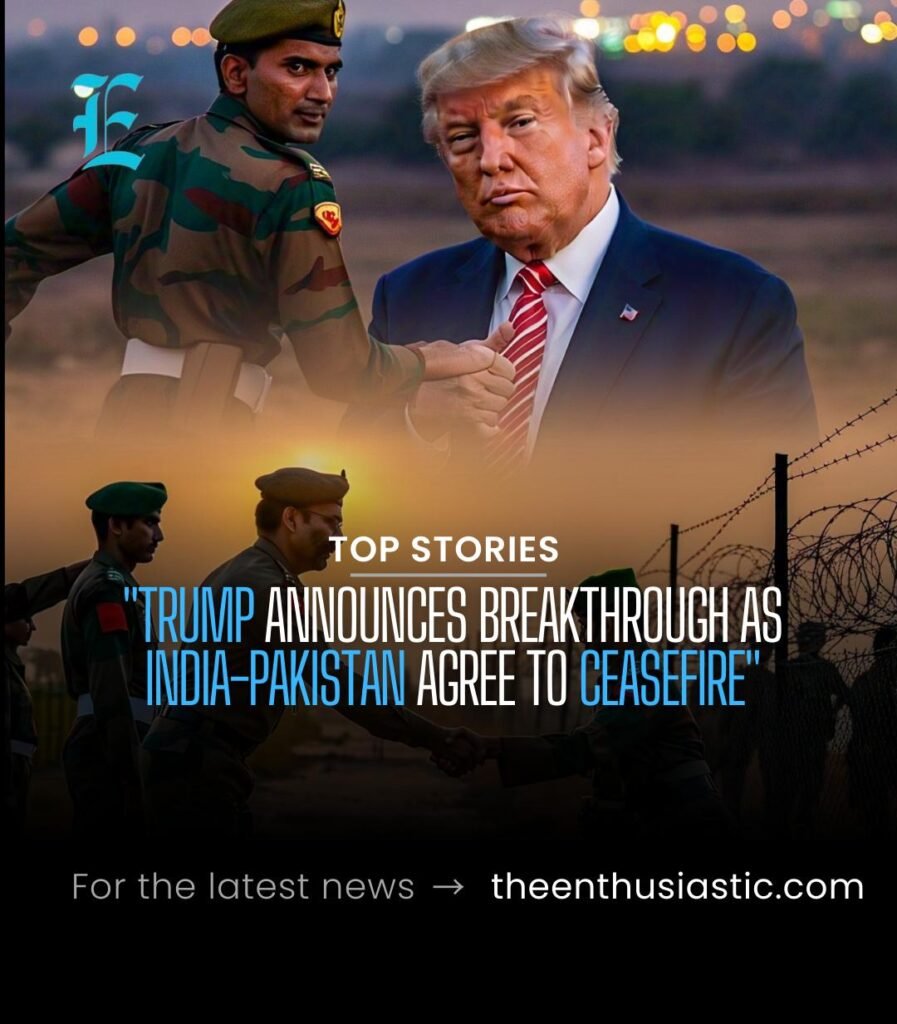Trump Announces Breakthrough as India-Pakistan Agree to Ceasefire

Table of Contents
Historic Ceasefire Ends Deadly Escalation Between Nuclear Neighbors
In a significant diplomatic breakthrough, India and Pakistan have agreed to a full and immediate ceasefire, ending what had become the most serious military confrontation between the two countries in over two decades. The agreement was brokered with the assistance of the United States, with former U.S. President Donald Trump claiming credit for the deal via his social media platform, Truth Social.
Trump Hails U.S. Mediation in Ceasefire Deal
President Trump announced the ceasefire on Saturday, stating, “After a long night of U.S.-mediated talks, I am pleased to share that India and Pakistan have agreed to a FULL AND IMMEDIATE CEASEFIRE. Congratulations to both nations for showing Common Sense and Great Intelligence.” Trump’s statement highlighted the pivotal role played by the U.S. in mediating the truce between the two nuclear-armed rivals.
Pakistan and India Confirm Ceasefire Implementation
Pakistan was the first to confirm the ceasefire through a statement by Foreign Minister Ishaq Dar, who emphasized Pakistan’s commitment to peace and sovereignty. “Pakistan has consistently advocated for peace and stability in the region,” Dar stated, confirming that the ceasefire would take immediate effect.
Shortly after, India also confirmed its agreement. In a press briefing in New Delhi, Indian Foreign Minister Vikram Misri detailed that Pakistan’s Director-General of Military Operations (DGMO) had contacted his Indian counterpart at 3:35 PM local time, with both sides agreeing to halt all military operations—by land, air, and sea—from 5:00 PM the same day.
Recent Conflict Triggered by Kashmir Attack
The recent hostilities were sparked by a terrorist attack on April 22 in Pahalgam, Kashmir, which left 25 Indian civilians and one Nepali national dead. India blamed the attack on Pakistan-backed militants and responded with missile strikes and drone operations, targeting Pakistani military installations near Rawalpindi.
In retaliation, Pakistan mobilized its troops and accused India of deliberately targeting civilian areas, raising fears of a full-scale war. Both nations exchanged accusations over civilian casualties, deepening tensions and pushing the region to the brink of conflict.
High-Level Diplomacy from the United States
U.S. Secretary of State Marco Rubio confirmed that he, along with Vice President JD Vance, had been in constant contact with Indian Prime Minister Narendra Modi and Pakistani Prime Minister Shehbaz Sharif in the 48 hours leading up to the ceasefire. Rubio revealed that India’s National Security Adviser Ajit Doval and Pakistan’s NSA Asim Malik were also directly involved in the discussions.
“Both governments have committed to an immediate ceasefire and will begin dialogue on broader issues at a neutral venue,” Rubio stated. He commended both countries for prioritizing peace and reaffirmed the U.S.’s support for continued diplomatic engagement.
Path Forward: Dialogue and Stability
Rubio also spoke with Pakistan’s Army Chief, General Asim Munir, offering U.S. assistance in facilitating constructive dialogue to prevent future escalations. The U.S. State Department echoed the sentiment, citing Rubio’s recent conversations with Indian Foreign Minister Subrahmanyam Jaishankar and Pakistan’s Ishaq Dar as instrumental in de-escalating the crisis.
The ceasefire marks a critical moment in South Asian geopolitics, with hopes now pinned on sustained dialogue, mutual restraint, and international cooperation to ensure long-term peace in the region.
